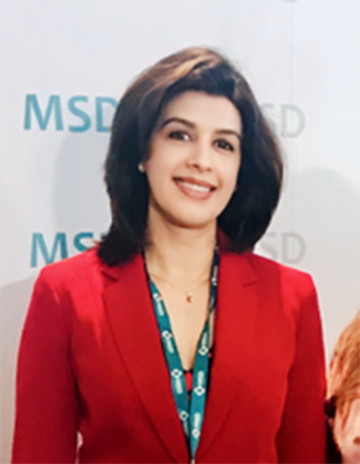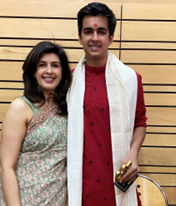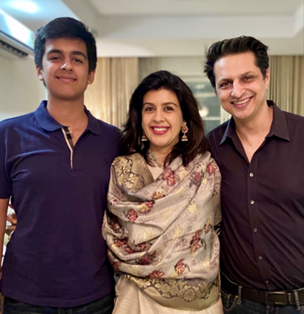Employee Ambassador Spotlight: Monisha Sharma
Background
I am the Senior Clinical Research Director in Asia Pacific and have been working at the company for nearly seventeen years. Growing up in New Delhi, India, and throughout my time in university studying pharmacology, I’ve been extremely grateful to have inspirational role models who’ve helped shape me into the professional I am today. Once the company began operations in India in 2006, I immediately joined the company because I was interested in the company’s pipeline, and I’ve never looked back. My biggest passion is science, specifically clinical trials. I also thoroughly enjoy mentoring colleagues early on in their careers and watching them grow and succeed.
I’ve found great joy in working cross-culturally. Right now, I have the pleasure of looking after four countries: India, Vietnam, Philippines and Indonesia. Developing my own skills through learning from others is something that I will always cherish. Outside of work, I love to dance and listen to music with my loving husband, Sandeep and 19-year-old son, Vir. With Vir away at college, we are now adjusting to life as “empty nesters”!

1. What initially drew you to the Merck for Mothers Employee Ambassador program?
Answer: In 2011, I remember seeing massive media coverage in India featuring Kenneth C. Frazier, now retired chairman and CEO of Merck, and his remarks spoken during the UN Assembly when our company’s commitment to maternal health was first announced. I was mesmerized by the way he so eloquently spoke about how no woman should have to die while giving life. His speech got me thinking about my own country – India - which has an immense maternal health care disparity. Even though we have the best-of-class treatment available, we still have very poor prenatal care and lose many mothers to postpartum hemorrhages (severe bleeding after childbirth) every year. Frazier had a mission when he spoke that was incredibly profound and impactful to me – even to this day.
As a little girl, I was brought up to believe that, in our culture, if a mother is healthy and stable, then a household is healthy and stable. Mothers are the driving force of the whole home. Unfortunately, many of my colleagues and the generation above us have mothers that lost babies during childbirth. Personally, my grandmother lost two babies during childbirth, so this topic is close to my heart. All of this drew me to the Merck for Mothers Employee Ambassador program.

2. What activities have you found to be most engaging when raising awareness about maternal health?
Answer: In India, colleagues attend employee ambassador calls and receive informational emails, however, I believe that a lot of folks in India still don’t understand the magnitude of maternal health issues in our country. India has one of the highest numbers of maternal deaths in the world and although our country has made significant progress in increasing the proportion of women who give birth in a health facility, maternal deaths are not decreasing as much as they should, largely due to poor quality of care.
Throughout my time as a Merck for Mothers Employee Ambassador, I’ve found that the best way to reach folks is through various meetings or talks especially when I can put a face to a name. Earlier this year, I invited Pompy Sridhar, Director of India Programs for Merck for Mothers, to speak at our Women’s Network Forum on how colleagues can contribute to improving maternal health care in India. That said, the activities that I find most engaging when raising awareness are the talks where colleagues share their personal experiences.

3. Could you share about the collaboration between the Women’s Network and Merck for Mothers?
Answer: I proudly co-lead the APAC Women’s Network and I think that the collaboration between Merck for Mothers and the Women’s Network is wonderful. The two programs work together to ensure that we continue to raise awareness about maternal health. Together, with Pompy who leads Merck for Mothers in India, the Women’s Network hosts workshops, Lunch-and-Learn sessions and informational talks to engage colleagues and spark interest. Additionally, we are hoping to support postnatal kit distribution with Project C.U.R.E. in India.
4.Can you share an Merck for Mothers program that you find particularly impactful in India?
Answer: There are many programs within India that have been inspirational, however one that stands out to me is the Manyata program. The Manyata program established a quality certification for private maternity care and supports health providers to improve the quality of care they offer and apply for quality certification. The program is now active in six states; Uttar Pradesh, Jharkhand, Maharashtra, Rajasthan, Tamil Nadu and Karnataka, where hundreds of providers have achieved Manyata certification.
Manyata stretches far in India – and I believe that if we can build an ecosystem of quality in the health system, then we can meet the challenges of maternal mortality.
5. Is there anything else you want share with others on your decision to join the Merck for Mothers Employee Ambassador program?
Answer: The Merck for Mothers Employee Ambassador program is a great space to drive impactful change. If you truly believe in the cause, which many of us at Merck do, you can champion maternal health no matter what your day-to-day role is. For me, I find the program a great way to give to my community. The Merck for Mothers’ mission is paramount to making a real difference and that, on its own, is very appealing to me.
Who We Are
What We Do
Where We Work
Learn More
Connect
Contact
Terms of Use
Privacy Policy